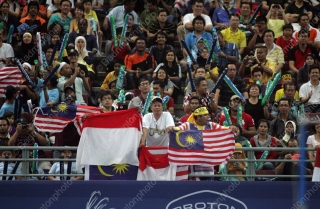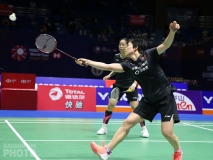The Malaysia Open kickstarted the new-looking Super Series circuit, and organisers are optimistic of what it means for badminton.
Dev S Sukumar/DNS. Kuala Lumpur
It’s early yet, but signs are that badminton is headed the right way over the new course charted by the Badminton World Federation this year. The Malaysia Open, the first of the 12-event Super Series circuit that was given a booster dose by the BWF for 2011, has elicited greater interest among spectators, sponsors and TV companies, and the federation can afford to give itself a pat on the back. In a statement before the tournament started, BWF President Kang Young Joong went so far as to call it “the dawn of a new era” for badminton.
The game has often been compared unfavourably with its richer sibling, tennis, and organisers have had few answers on why badminton, despite its popularity in pockets across the world, has not yet ‘arrived’ as a global sport. The 12-event Super Series that started in 2007 had fallen into a predictable pattern within a couple of years, and it was thus that the BWF decided to elevate five of these to a ‘Premier’ status, along the lines of the four Grand Slams in tennis.
The other immediate change was the prize money. The BWF sold the title rights to OSIM, a healthcare products company, for branding the Super Series. The Korea Open became the first million-dollar prize money event in badminton, offering USD 1.2 million — an unheard-of figure in the sport, and other events too doubled their prize money by netting more sponsors and TV tie-ups.
“The total prize money last year for all the Super Series was USD 2.9 million; this year it is USD 4.6 million,” a BWF official said. “The most apparent change this year is that the Chinese have come. They usually skip this event.”
Stung by the withdrawal of several top contenders from the Super Series last year, the BWF mandated that the ‘Premier’ events would be compulsory — with players coughing up a fine of Rs 5,000 if they were to skip any of the five. The top Chinese, including superstar Lin Dan, had missed most of the top tournaments last year, depriving the events of their legitimacy, but the BWF’s threat and the higher prize money seem to have worked, as the Chinese arrived in strength for the season-opening Malaysia Open. Simultaneously, there has been increased demand for TV coverage, especially from India, where Saina Nehwal has catalysed interest in the game.
“We have the product now,” said Thomas Lund, BWF Chief Operations Officer, who took charge in 2009. “I think the organisers and those working behind the scenes are excited about what’s happening. People can see that things are slowly picking up in terms of branding and making it (Malaysia Open) part of a series that’s well planned, and making the tournament part of a bigger scheme, part of a bigger concept, where fans can follow the players through the year. That’s how we want to present the game.”
The next few months will tell if the BWF has lived up to its promise.
![MALAYSIA OPEN – Signs of Superseries revival The Malaysia Open kickstarted the new-looking Super Series circuit, and organisers are optimistic of what it means for badminton. Dev S Sukumar/DNS. Kuala Lumpur It’s early yet, but signs are […]](http://www.badzine.net/wp-content/uploads/Newsflash-thumbnail.png)








Leave a Reply